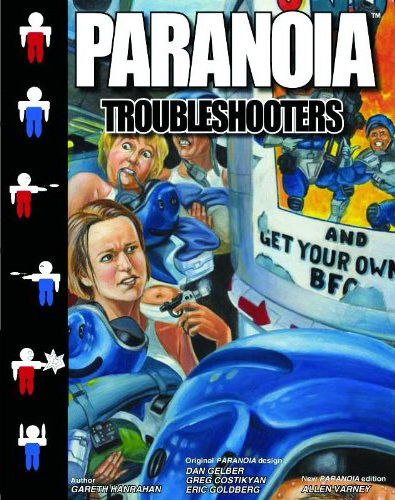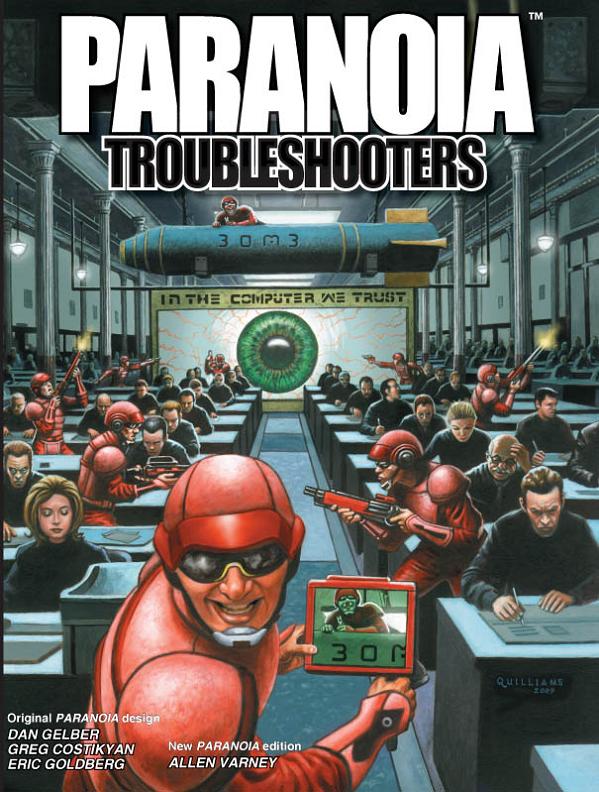YOU ARE IN ERROR. NO-ONE IS SCREAMING. (Paranoia: Troubleshooters Review)
YOU ARE IN ERROR. NO-ONE IS SCREAMING.
Paranoia: Troubleshooters is the latest incarnation of the classic game of dystopian humor. A mixture of 1984, Brave New World, Catch-22, and Monty Python, Paranoia pits the PCs against treacherous enemies, insane bureaucracy, and of course, each other.
YOU HAVE REQUESTED INFORMATION REGARDING: ALPHA COMPLEX. LOYAL CITIZENS ARE PROVIDED WITH ALL THE INFORMATION THEY REQUIRE, YOU ARE THEREFORE A TRAITOR. PLEASE REPORT FOR TERMINATION. THANK YOU.
In the year [CLASSIFIED] civilization was destroyed by a giant [CLASSIFIED]. The remnants of humanity now live in a gigantic underground facility called Alpha Complex run by an immensely powerful and benevolent Computer. Friend Computer cares for each of its citizens, assigning each a security clearance (ascending through the spectrum from Infrared to Ultraviolet) and meeting their needs accordingly. Unfortunately, Friend Computer is insane, being as paranoid as it is powerful (especially about Communists). At the same time, it is convinced it is infallible and Alpha Complex is a utopia. It therefore expects every citizen to cheerfully obey its every order – even when ordering that citizen’s termination. What makes Paranoia playable and so much fun is how badly Alpha Complex functions. It’s like Brave New World designed and run by Vogons. As the game says, there are security cameras everywhere. Some of them even work.
TOTAL SAFETY THROUGH TOTAL SECUR—
Players take the role of troubleshooters, hapless saps who have been assigned to undertake various missions for the Computer. As clearance Red citizens they are fractionally more adept then the drooling drug-addled Infrareds but still near the bottom of the security clearance food chain. Troubleshooter missions usually involve hunting mutants, thwarting traitorous secret societies, or transporting suspiciously ticking boxes from one nondescript room to another. To make matters worse, the troubleshooters will be given wrong information; contradictory instructions; and equipment that is faulty, irrelevant and/or very, very dangerous. To make matters even worser, each and every troubleshooter is secretly a mutant and a member of a traitorous secret society.
From here the game becomes a minefield of conflicting loyalties, contradictory missions, backstabbing teammates, insane bureaucracies, and newspeakful propaganda, as each player tries to hide his own treason while uncovering treason in the others. The real goal is to survive. Life in Alpha Complex is cheap, so cheap that it comes in packs of six. Even with back-up clones, troubleshooters die at an alarming rate (well, alarming to the troubleshooters anyway). Loyalty to the Computer will not save you. Loyalty to your secret society will not save you. Loyalty to your teammates certainly won’t save you. Completing your mission will not save you. Your mutant power will not save you. You must save yourself and to do that you must be clever, devious, ruthless, and adept at doublethink.
ONWARD, BRAVE TROUBLESHOOTERS, FOR THE GLORY OF ALPHA COMPLEX!
The book presents over a dozen secret societies (from the hated Communists to the mysterious Illuminati to the frightening PURGE) and over 50 mutant powers (some much more useful than others, but all treasonous!). There is also a wealth of forms, questionnaires, illustrations, and examples, all carefully fabricated and calibrated to embody those eternal watchwords of Alpha Complex: Fear & Ignorance, Ignorance & Fear.
The book also provides plenty of advice for the players and GM alike. And plenty of advice is needed because Paranoia is very different from traditional RPGs, and player tactics that would serve you well in D&D will get you folded, spindled, and mutilated in Alpha Complex. For the GM there are copious amounts of guidance, charts, and props available to help you achieve that special Alpha Complex state of mind.
There are, of course, rules but they are not terribly important. Nobody plays Paranoia for the rules. It’s a basic roll-a-d20-and-get-under-your-skill system. Simple and unobtrusive. There are, however, two aspects of the rules that brilliantly reinforce the paranoia of Paranoia.
The first are Perversity Points. These tokens (I use little glass beads, red of course) are given to the players not the characters (the player retains her PPs after her character dies) as an award for being entertaining and should be awarded liberally and immediately. With these Perversity Points the players can modify their own or another player’s die roll by making up positive or negative modifiers on the spot. All this is subject to GM approval, of course, but when the table is opened to unlimited Perversity spending the players will erupt into a crazy bidding war, piling on more and more outlandish modifiers. It makes calculating a Difficulty Number one of the most fun parts of the session!
The second important aspect of the rules is simply that they are way above the players’ clearance, making it treasonous for the players to argue the rules.
YOU WILL HAVE FUN. FUN IS MANDATORY.
Paranoia is one of those games that screams for props, all of them properly color-coded, of course: red pens, red dice, even red snacks. I use Swedish Fish to represent the Troubleshooters’ remaining clones. Every time a clone dies, the player eats a fish – after that fish has been stretched, twisted, cut, etc. to graphically illustrate the manner of the demise. And don’t forget the scraps of paper. Your typical game of Paranoia is a virtual blizzard of secret notes, each more treacherous than the last.
The game is fairly well supported, with over a dozen published adventures so far, a very sturdy GM shield, a book of very important forms, and two additional complete games detailing Alpha Complex citizens of higher clearance level (Paranoia: Internal Security and Paranoia: High Programmers!). The game is very well supported if you consider that it is easily compatible with the earlier editions going back to 1984.
Paranoia: Troubleshooters can be an amazing amount of fun (it was the most fun I ever had at the table) but is vitally important that all the players are on the same page. Everyone must be in the mood to enjoy some frustration and death and nobody should take anything personally. The players need to trust the GM while simultaneously distrusting their fellow players (and the NPCs. And the vending machines. And everything else). The GM needs to be quick on her feet and ready to improvise at the drop of a focused-particle-inverse-fusion-bomb. (HINT: use simple adventures without a specific ending, the PCs will make even the simplest mission insanely complicated and will never end up where you planned).
Even if you’re never lucky enough to play a session, Paranoia: Troubleshooters is a great read, a genuinely entertaining and hilarious book. Like Call of Cthulhu, it is a book every gamer should have in his library as an example of how different RPGs can be.
THE ABOVE INFORMATION IS CLEARANCE VIOLET. IF YOU ARE BELOW CLEARANCE VIOLET PLEASE REPORT TO THE NEAREST TERMINATION BOOTHE IMMEDIATELY. THANK YOU.





